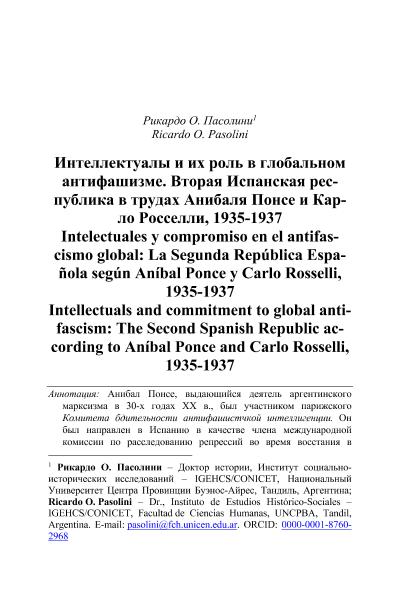Artículo
Aníbal Ponce, máxima figura del marxismo argentino en los años '30, participaba en París en el Comité de Vigilance des Intellectuels Antifascistes, y fue enviado a España como miembro de una comisión evaluadora internacional de los sucesos represivos en la Insurrección de Asturias. Cuando vuelve a la Argentina luego de presentar un informe y realizar una visita iniciática a Moscú, diserta sobre la situación española, sobre los límites políticos de la Segunda República y sobre el reciente triunfo del Frente Popular y sus desafíos. Allí postula la idea de los sucesos de Asturias como derrota victoriosa, como un preludio de la revolución que se avecina. Desde su exilio parisino, Carlo Rosselli, el líder del movimiento antifascista italiano Giustizia e Libertà, reflexionó críticamente sobre la experiencia española, y llegó a liderar una legión italiana en el frente de guerra de Aragón. Ideológicamente más cerca de los anarquistas que de los comunistas, Rosselli advierte sobre los límites de la acción revolucionaria en España, pero anticipa una opinión similar a la Ponce sobre la derrota momentánea de la clase obrera. En ambos casos, la experiencia española los lleva a considerar el tránsito de la especulación a la acción como el mayor destino posible para la clase intelectual. Когда он возвращается в Аргентину после представления доклада и после своего Москвы, он пишет об испанской ситуации, о политических ограничениях Второй республики, о недавнем триумфе Народного фронта и его вызовах. Он утверждает, что астурийское восстание было победоносным поражением, став прелюдией грядущей революции. Из своего парижского убежища Карло Росселли (лидер итальянского антифашистского движения Giustizia e Libertà) критически рассматривал испанский опыт, хотя и возглавил итальянский легион на арагонском фронте войны. Идеологически он был ближе к анархистам, чем к коммунистам. Росселли предупреждает о пределах революционного действия в Испании, но предвосхищает взгляд Понсе о возможности временного поражения рабочего класса. В обоих случаях испанский опыт заставляет их требовать перехода от разговоров к действию, что является единственным возможным выбором для интеллигенции. Aníbal Ponce, the highest figure of Argentine Marxism in the 1930s, was in Paris participating in the Antifascist Intellectuals Vigilance Committee, and was sent to Spain as a member of an international evaluation commission of the repressive events in the Asturias Insurrection. When he returns to Argentina after presenting a report and making an initiatory visit to Moscow, he speaks on the Spanish situation, on the political limits of the Second Republic and on the recent triumph of the Popular Front and its challenges. There he posits the idea of the events in Asturias as victorious defeat, as a prelude to the coming revolution. Since his Parisian exile, Carlo Rosselli, the leader of the Italian anti-fascist movement Giustizia e Libertà, reflected critically on the Spanish experience, eventually leading an Italian legion on the Aragon war front. Ideologically closer to the anarchists than to the communists, Rosselli warns of the limits of revolutionary action in Spain, but anticipates a similar opinion to Ponce on the momentary defeat of the working class. In both cases, the Spanish experience leads them to consider the transition from speculation to action as the greatest possible destination for the intellectual class.
Intelectuales y compromiso en el antifascismo global: La Segunda República Española según Aníbal Ponce y Carlo Rosselli, 1935-1937
Título:
Интеллектуалы и их роль в глобальном антифашизме: Вторая Испанская республика в трудах Анибаля Понсе и Карло Росселли, 1935-1937;
Intellectuals and commitment to global antifascism: The Second Spanish Republic according to Aníbal Ponce and Carlo Rosselli, 1935-1937
Intellectuals and commitment to global antifascism: The Second Spanish Republic according to Aníbal Ponce and Carlo Rosselli, 1935-1937
Fecha de publicación:
08/2021
Editorial:
Instituto de Historia Universal de la Academia de las ciencias de Rusia
Revista:
Almanaque histórico latinoamericano
ISSN:
2305-8773
e-ISSN:
2713-0282
Idioma:
Español
Tipo de recurso:
Artículo publicado
Clasificación temática:
Resumen
Archivos asociados
Licencia
Identificadores
Colecciones
Articulos(IGEHCS)
Articulos de INSTITUTO DE GEOGRAFIA, HISTORIA Y CS. SOCIALES
Articulos de INSTITUTO DE GEOGRAFIA, HISTORIA Y CS. SOCIALES
Citación
Pasolini, Ricardo Oscar; Intelectuales y compromiso en el antifascismo global: La Segunda República Española según Aníbal Ponce y Carlo Rosselli, 1935-1937; Instituto de Historia Universal de la Academia de las ciencias de Rusia; Almanaque histórico latinoamericano; 31; 8-2021; 200-222
Compartir
Altmétricas




